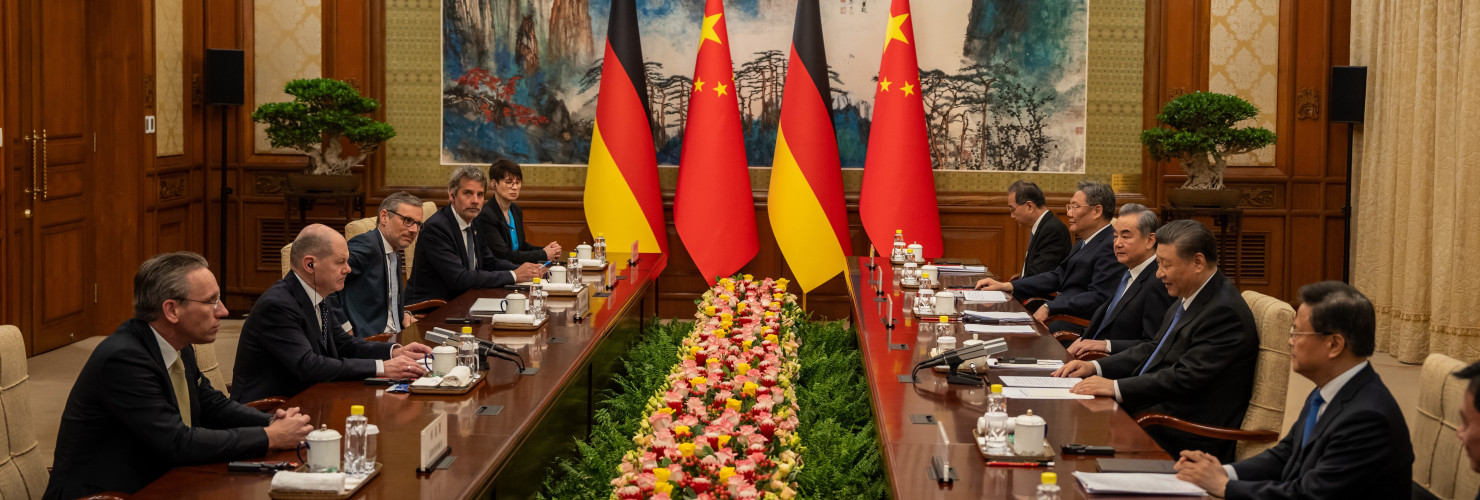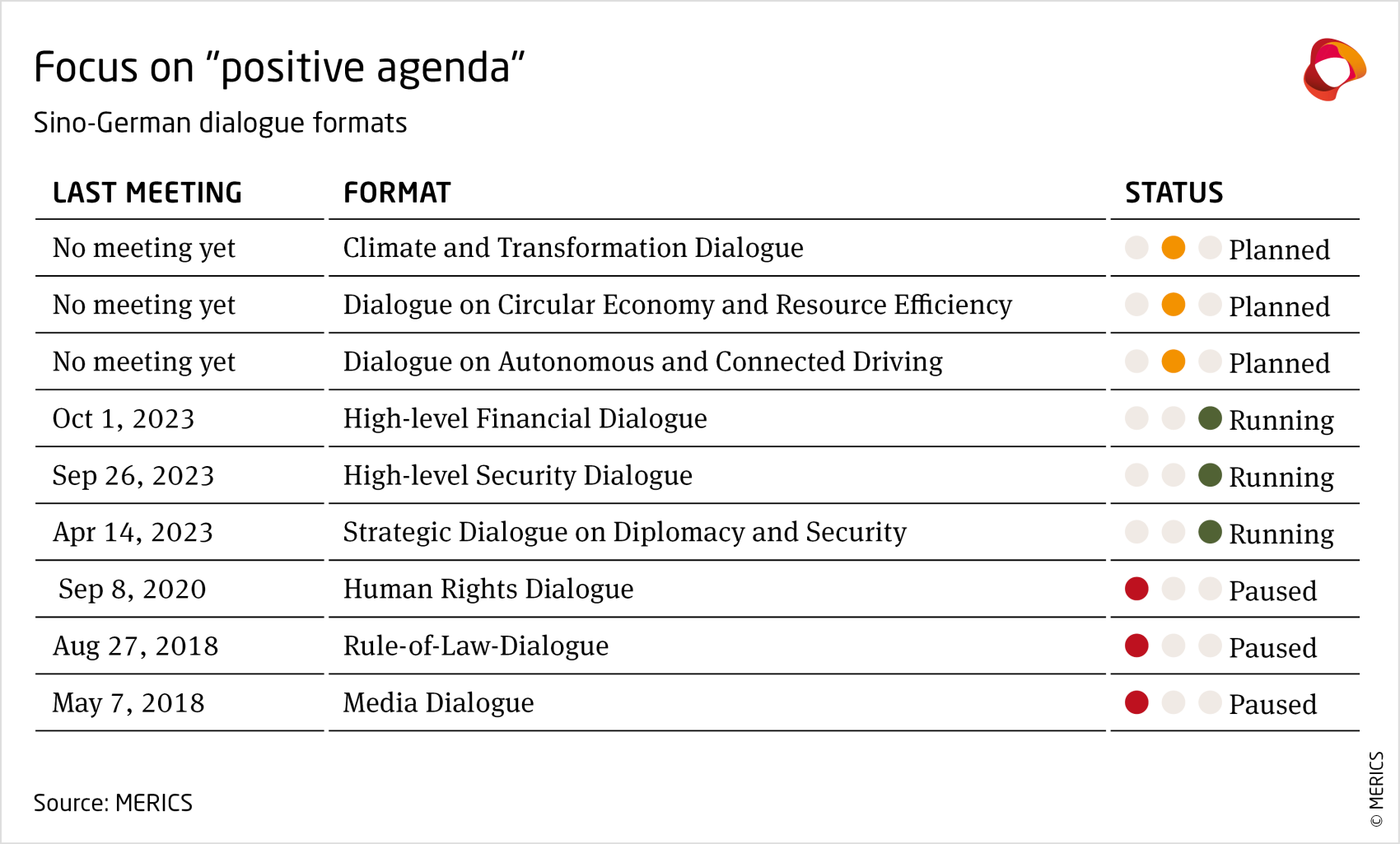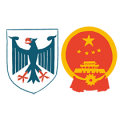

German Chancellor Scholz's visit to China + China-Iran + Overcapacities
TOP STORY
China conjures vision of smooth cooperation in Scholz visit
In a strategy of omission unlikely to keep troubles at bay, China’s government and state media resolutely glossed over concerns that German Chancellor Olaf Scholz brought to the table during his state visit this week. German and European worries over market access, potential price dumping due to excess production, and China’s role in international conflicts like Ukraine were brushed aside, and public messaging was doggedly fixated on cooperation and strategic ties.
On his three-day visit to Chongqing, Shanghai and Beijing, Scholz brought a 12-member delegation of corporate representatives and three ministers – environment, agriculture, digital and transport. He also met with President Xi Jinping and Premier Li Qiang.
In the meeting between both leaders, Xi called on Germany to focus on a win-win-cooperation, set aside differences, and keep EU-China relations on track, with the key message that German dependence on China was a sign of strong bilateral ties – not a risk. While Scholz managed to secure an opening for the import of German food products, the Chinese government statement on the meeting directly connected Germany’s demands for market access to the treatment of Chinese companies abroad.
Scholz’s chosen theme of a bilateral “transformation dialogue” focused on sustainability, green tech and innovation and his commitment to continued cooperation were well received in Beijing. Party-state media spotlighted China’s 10-year strategic partnership with Germany and framed close trade relations as an anchor of stability in today’s fraught geopolitical landscape. Videos of Xi and Scholz walking through gardens of flowers and fishponds created the impression of tranquility and harmony.
Notably absent from Chinese and German official statements was the critical issue of human rights in China, despite its increasing relevance for ethical supply chain standards. Ongoing debates in Germany and the EU on research collaboration, new espionage allegations and Beijing’s efforts to influence public opinion abroad, as well as a potential conflict over Taiwan were equally missing from the official agenda.
MERICS analysis: “Although Scholz did raise key points of concern for Germany and the EU, the visit highlighted China’s success in steering the conversation and limiting it to issues China can deflect or push back on,” says Katja Drinhausen, Head of MERICS Politics and Society Program. “But this strategic silence from both sides glosses over issues – from human rights to cybersecurity – that will eventually resurface and make smooth sailing for bilateral relations unlikely.”
Media coverage and sources:
- Chinese MFA: Full statement on the visit
- China Daily: Xi meets Scholz, highlighting mutual benefits
- DW: Scholz welcomes Chinese cars but urges 'fair' competition
- Handelsblatt: Kanzler in Peking: Wo Scholz Frieden wollte und nur Äpfel bekam
- Reuters: Germany, China sign joint declaration on car data sharing
TOPICS
Xi-Scholz silence on Iran may reflect China’s weak leverage
The facts: Hopes that German Chancellor Olaf Scholz might convince President Xi Jinping to use China’s good relations with Iran and Russia to stem escalating conflicts in the Middle East and Central Europe did not pan out during Scholz’s visit to China this week. Even as Iran attacked Israel over the weekend, there was no public mention from either side of China’s potential role in calming tensions in the Middle East, reflecting Sino-European disagreement on geopolitics and possibly also China’s lack of leverage to influence its partners.
What to watch: Besides strengthened bilateral relations, Beijing and Tehran share an increasingly close trilateral partnership with Moscow. In recent years, the three have deepened cooperation both through military collaboration and Iran’s admission into the Shanghai Cooperation Organization and BRICS. Still, European governments should not let up on pressure for common solutions to escalating conflicts, especially as China wants to establish itself as a credible international peacemaker and responsible global power.
MERICS analysis: “Despite the growing collaboration between China, Russia, and Iran, talks of a ‘trilateral alliance’ are overblown,” says Eva Seiwert, Analyst at MERICS. “The extent to which China has leverage over its partners’ actions is questionable. Major breakthroughs may be unlikely soon, but European policymakers must continue pressing Beijing to counter the aggressive behavior of its partners. This will be most successful if Europe acts collectively.”
More on the topic:
Media coverage and sources:
- PRC Ministry of Foreign Affairs: 习近平会见德国总理朔尔茨 — 中华人民共和国外交部
- Reuters: Iran able to 'handle situation' and spare Middle East more tension, China's foreign minister says
- The Economist: How China, Russia and Iran are forging closer ties
Beijing pushes back as US and European leaders raise concerns on overcapacity
The facts: Beijing is downplaying US and European concerns about overcapacity in China – excess production that can lead to price dumping and unfair competition. Current messaging from China comes after recent visits by top US and German officials, who have warned about overcapacity. During her recent visit, US Secretary of the Treasury, Janet Yellen, expressed concerns about the issue in green tech such as EVs, batteries, and solar panels. German Chancellor Olaf Scholz this week made similar claims. Chinese officials and media outlets quickly pushed back, calling out the warnings as another variation of the “China threat theory.” Despite the rhetorical pushback, Beijing itself has told officials to be vigilant about overcapacity risks.
What to watch: The Government Work Report in early March referred to overcapacity risks driven by China’s weak recovery and made it a focus for officials to address in the coming year. Excess production is an inherent product of China’s industrial policy, as a wide range of supply-side support measures steer heavy investment into hand-picked sectors. When working ideally, industrial policy spurs a flood of market entrants in a new technology, then culls the herd with lower support and higher standards, forcing consolidation and leaving national champions as survivors. However, the economic downturn and other factors are limiting consolidation. The crackdown on traditional investment classes like real estate or consumer internet companies has left capital with only one real direction – toward more manufacturing.
MERICS analysis: “Overcapacity is a feature of China’s economic model, not a bug. In that sense, it is no surprise if Beijing argues that overcapacity is a natural development driven by sudden shifts in supply and demand which occurs when industries emerge at Beijing’s direction,” says Jacob Gunter, Lead Analyst at MERICS. “With little material pushback from the US and EU for earlier rounds of overcapacity, which generated cheap goods for our consumers and manufacturers, Chinese officials may be caught off guard that this is now an issue.”
Media coverage and sources:
Chinese tech company does what US rivals haven’t dared to do – join the EV race
The facts: Smartphone maker Xiaomi managed the kind of sectoral crossover even US tech companies have shied away from when it held a splashy event to launch its first electric vehicle (EV). The higher-end version of the new “SU7” boasts performance specifications that rival or exceed those of western competitors like Tesla or Mercedes-Benz – at less than half the price. Chinese tech companies are flocking to traditional industries like car making as the government pushes to increase technical competence – and exports – in higher value-added goods. In the process, tech companies could transform traditional industries.
What to watch: Xiaomi’s entry into EVs is all the more remarkable given that US tech standout Apple only recently abandoned its ambitions in the sector. The Chinese company is combining its driving and operating-system software with the battery technology of CATL and the production expertise of Beijing Automobile Works Group. The agility of combining advanced software with basic EV components contrasts with the approach of European carmakers, which still focus on more complex engineering. Huawei, Baidu and other Chinese tech companies are also collaborating with carmakers to join Xiaomi in crossing sectoral boundaries.
MERICS analysis: “Chinese tech companies are following the government’s wishes to focus on the real economy and look set to transform traditional industries in the process. Xiaomi wants to turn cars into smartphones-on-wheels – a mix of new and old that could soon also disrupt other traditional industries like power grids,” says MERICS Analyst Wendy Chang. “EVs made by tech companies spell even more competition for Western and Chinese EV makers alike. Established European carmakers, in particular, could struggle to compete with their agile approach.”
Media coverage and sources:
- Nikkei Asia: China's Xiaomi jumps into EV market battle with gusto
- Xiaomi Founder Lei Jun’s launch event script: 雷軍:小米SU7 現已開啟定購|人車合一,我心澎湃
METRIX
1h 33m 44s
This is how long it took Chinese long-distance runner He Jie to win Beijing’s recent half marathon. The finishing time could have been faster – and the race winner from Kenya or Ethiopia – had the three runners alongside him not seemingly made way for the Chinese athlete on the home strait. Officials are now looking into the incident. He's rivals were all placed joint second with a time of 1 hour, 33 minutes and 45 seconds. (Source: NYT)
Review
The Gilded Cage: Technology, Development, and State Capitalism in China by Ya-Wen Lei (Princeton University Press, 2023)
In “The Gilded Cage”, Harvard University professor Ya-Wen Lei does an amazing job at exploring how China’s pursuit of technological progress affects Chinese factory workers, industrial entrepreneurs and software engineers. The metaphor of the birdcage explains how the state nurtures high-tech companies – the birds – through a very deliberate use of regulations, incentives and other policy instruments – the cage. Caught in it, workers like delivery and ride-share drivers are exploited by the algorithms of digital capitalism. “Tech giants in China have become cobuilders of the expanding instrumental apparatus under China’s techno-developmental regime,” Lei concludes.
Most people that Ya-Wen Lei interviewed from 2017 to 2021 accept this sacrifice is necessary for China to get ahead. Only a handful of workers speak out against their exploitation, only a few software engineers tune out, practically no factory owners who find robots impractical fail to get on board with programs to replace workers. Gilded Cage is essential reading for anyone who wants to understand how China’s workers and elites are responding to intensifying global competition (although the author could have done more to spell out the implications for foreign workers, companies and governments).
Lei does a great job of describing how Beijing turned its belief in technological progress into policy in the late 2010s – and the contradictions, real or apparent, of this fetish. She sees the 2020-2021 tech crackdown as a culling of out-of-fashion “birds” to make room for new ones in “the cage”: “This time, the new birds are firms that can promote the integration of the digital and real economy and facilitate the digital upgrading and transformation of traditional industries.” Lei shows how the state can both shift its attention and sidestep uncomfortable questions about its instrumentalist approach.
Reviewed by Jeroen Groenewegen-Lau
MERICS China Digest
Chinese scientists rigged a low-cost AI computer chip to power a hypersonic weapon (SCMP)
A research team in China has created a step-by-step guide on how to use a low-cost AI chip for boosting hypersonic weapons. To this end, the researchers installed a Nvidia Jetson TX2i GPU computer module – which can be purchased online – into an air-breathing hypersonic aircraft capable of speeds exceeding Mach 7. (24/04/16)
China’s semiconductor output jumps 40% in first quarter (SCMP)
China’s total integrated circuit (IC) output surged to 98.1 billion units in the first quarter, a sign that the country is expanding its production of older-generation chips while being constrained by US trade restrictions on advanced chip-making equipment. This could cause a trend of investment leading to overproduction and, potentially, Chinese dominance of global legacy-chip production. (24/04/16)
Beijing revises religious regulations for Xinjiang (The Economist)
Beijing this year revised religious regulations for the far-western region of Xinjiang, home to Uyghurs and other Muslim minorities. The rules put a special emphasis on the right not to believe in any religion. In addition, they impose new controls on religious teaching and other areas. (24/04/11)
China continues to persecute family of dissidents unlawfully, finds report (The Guardian)
The Chinese Human Rights Defenders’ (CHRD) report argues that China continues the practice despite a pledge to end collective punishment. The group lists intimidation and harassment, forced evictions, travel bans and criminal proceedings against family members in China and diaspora communities as examples. (24/04/15)

